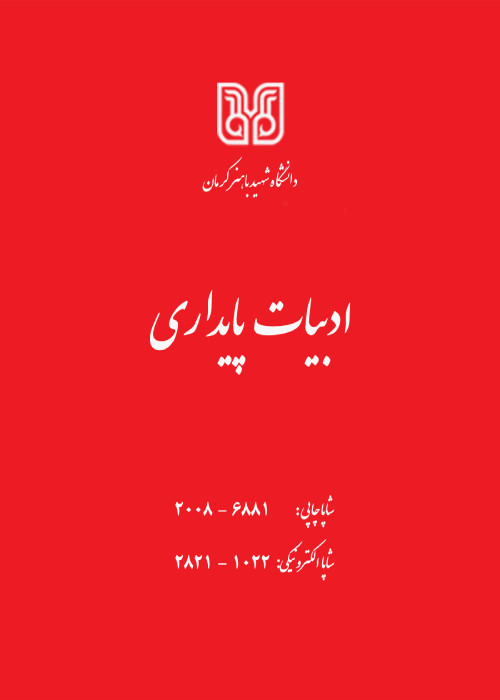Revisiting the Role and Function of Mythical Figures in Afghanistan Resistance Poetry (A Case Study of Wasef Bakhtari's Poems Based on Gérard Genette's Theory)
The Myth is the most significant embodiment of imagination in a language, narratable, visual, and culturalized symbol partially associated with ontological and cosmological reality and, in part, related to national beliefs. With their characteristic recurrence, myths have an intertextual nature. Hence, their reproduction in different works throughout history. Based on their knowledge of this potential to represent resistance-related matters, Afghanistan's resistance poets have benefitted from the symbolic aspects of myths.One of the Afghan poets who extensively draws on resistant imagination and mythical recurrence is Wasef Bakhtari. He recreates myths with measured language in a symbolic and multifaceted fashion, voicing its protest vis-a-vis the established political autocracy and the aggressors.
The present study seeks to revisit the role and function of mythical figures in Afghanistan resistance poetry to analyze how mythical elements are reproduced in Wasef Bakhtari's resistance poetry using a descriptive and analytical methodology and an intertextual approach based on Gérard Genette's ideas.
As myths need literature and art to survive, poets undergird their works by tapping into the potential of myths. By doing so, they have given life to human civilization, mythology, and culture while immortalizing themselves. Nevertheless, poets do not employ mythology solely for aesthetic reasons. Instead, as demonstrated by a significant strand of cultural studies, they sometimes do so to communicate political and social messages. In particular, the symbolic language of myths helps poets expand their words' meaning-making capacity by using intertextual references. Contemporary poets engage in literary creation and beautifully recreate, revisit, and rewrite myth to fend off contemporary de-mythicization and transfer human experiences in ancient ages. By doing so, they seek to contribute to the preservation of their authentic identity and culture. This study discusses mythical figures in Wasef Bakhtari's resistance poetry. Although the scholarship on mythology is prolific in Iran due to its interdisciplinary nature, as far as this research shows, there is yet to be a book or article written on the subject of "Revisiting the Role and Function of Mythical Figures in Afghanistan Resistance Poetry. " The extent and frequency with which Bakhtari uses myths and mythology in the context of resistance calls for a comprehensive study. Therefore, this paper undertakes a methodical analysis of myths in Wasef Bakhtari's resistance poetry.
The present research suggests:Most myths reborn in Bakhtari's resistance poetry are among national myths whose intertextuality is primarily implicit. However, it also appears as allusions, quotations, and explicit referential intertextuality.For Wasef, myth is an instrument for the audience to rethink their identity. He mobilizes the persuasion potential of the myths to foster a sense of national self-confidence and provoke social movements against domestic authoritarianism and foreign aggression. He relies on myths to reinforce his epic and resistance positions and stir collective emotions, calling on their audience to battle the political repression and autocracy of the rulers and the aggressors. Moreover, Wasef uses national myths to depict themes related to resistance. The most critical themes that Bakhtari reflects in his poetry with the aid of national myths due to their resistance theme include the Red Army's attack and the prediction of its disgraceful failure, betraying the fighters, the country's anarchic conditions, and its relation to the poet and his people, the collapse and disappearance of all material and spiritual values, the unprosecuted killing of brave young men, political despotism and tyranny, hope for improvement and the end to the reign of the despots, schism, and division resulting from egocentrism, describing the martyrs, reprimanding the warriors for participating in civil wars and political and social corruption.Wasef Bakhtari has devoted his attention to recreate the narratives and figures of national myths. Remarkably, he has focused on the personas of Rostam, Siavash, Zahhak, and Kaveh to epic potentials of mythical narratives and figures to entice the public to create national resistance movements to combat domestic despotism and foreign aggressors. Even though the reflection of mythical narratives in Bakhtari's poetry is of aesthetic value, myths fulfill a political and resistance function in his poetry to communicate political and social messages based on a critical approach.
- حق عضویت دریافتی صرف حمایت از نشریات عضو و نگهداری، تکمیل و توسعه مگیران میشود.
- پرداخت حق اشتراک و دانلود مقالات اجازه بازنشر آن در سایر رسانههای چاپی و دیجیتال را به کاربر نمیدهد.


